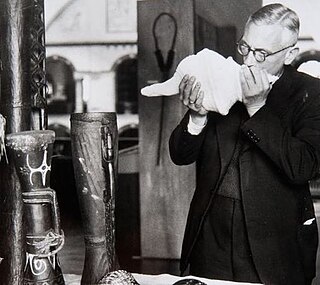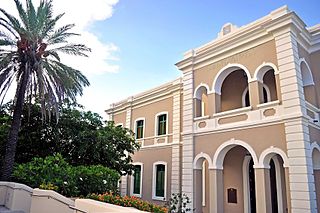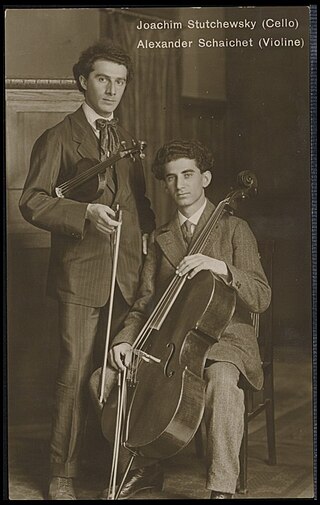Playing or learning by ear is the ability of a performing musician to reproduce a piece of music they have heard, without having seen it notated in any form of sheet music. It is considered to be a desirable skill among musical performers, especially for those that play in a musical tradition where notating music is not the norm.
Music history, sometimes called historical musicology, is a highly diverse subfield of the broader discipline of musicology that studies music from a historical point of view. In theory, "music history" could refer to the study of the history of any type or genre of music. In practice, these research topics are often categorized as part of ethnomusicology or cultural studies, whether or not they are ethnographically based. The terms "music history" and "historical musicology" usually refer to the history of the notated music of Western elites, sometimes called "art music".

Ethnomusicology is the multidisciplinary study of music in its cultural context, investigating social, cognitive, biological, comparative, and other dimensions involved other than sound. Ethnomusicologists study music as a reflection of culture and investigate the act of musicking through various immersive, observational, and analytical approaches drawn from other disciplines such as anthropology to understand a culture’s music. This discipline emerged from comparative musicology, initially focusing on non-Western music, but later expanded to embrace the study of any and all different kinds of music of the world.

The Royal College of Music (RCM) is a conservatoire established by royal charter in 1882, located in South Kensington, London, UK. It offers training from the undergraduate to the doctoral level in all aspects of Western Music including performance, composition, conducting, music theory and history, and has trained some of the most important figures in international music life. The RCM also conducts research in performance practice and performance science.

A composer is a person who writes music. The term is especially used to indicate composers of Western classical music, or those who are composers by occupation. Many composers are, or were, also skilled performers of music.

The Royal Conservatoire is a conservatoire in The Hague, providing higher education in music and dance. The conservatoire was founded by King William I in 1826, making it the oldest conservatoire in the Netherlands. Since September 2021, the KC is housed in the Amare building in the centre of the Hague, together with the Residentie Orkest and the Nederlands Dans Theater (NDT).
In music, ear training is the study and practice in which musicians learn various aural skills to detect and identify pitches, intervals, melody, chords, rhythms, solfeges, and other basic elements of music, solely by hearing. Someone who can identify pitch accurately without any context is said to have perfect pitch, while someone who can only identify pitch provided a reference tone or other musical context is said to have relative pitch. Someone that can't perceive these qualities at all is said to be tone deaf. The application of this skill is somewhat analogous to taking dictation in written/spoken language. As a process, ear training is in essence the inverse of reading music, which is the ability to decipher a musical piece by reading musical notation. Ear training is typically a component of formal musical training and is a fundamental, essential skill required in music schools and the mastery of music.

The New England Conservatory of Music (NEC) is a private music school in Boston, Massachusetts. The conservatory is located on Huntington Avenue along the Avenue of the Arts near Boston Symphony Hall, and is home to approximately 750 students pursuing undergraduate and graduate studies, and 1,500 more in its Preparatory School and School of Continuing Education. NEC offers bachelor's degrees in instrumental and vocal classical music performance, contemporary musical arts, composition, jazz studies, music history, and music theory, as well as graduate degrees in collaborative piano, conducting, and musicology. The conservatory has also partnered with Harvard University and Tufts University to create joint double-degree, five-year programs.

The Puerto Rico Conservatory of Music is a public conservatory in San Juan, Puerto Rico. It has hosted a number of international musicians as students as well as faculty, and has a longstanding relationship with the classical music movement in Puerto Rico, including the annual Casals Festival and the Puerto Rico Symphony Orchestra (PRSO).

Boston Conservatory at Berklee is a private performing arts conservatory in Boston, Massachusetts. It grants undergraduate and graduate degrees in dance, music, and theater.
Portugal has a long music history, beginning around the year 600 C.E, which accompanied and strongly contributed to the development of the music history in Europe.

The Accademia Nazionale di Santa Cecilia is one of the oldest musical institutions in the world, founded by the papal bull Ratione congruit, issued by Sixtus V in 1585, which invoked two saints prominent in Western musical history: Gregory the Great, for whom the Gregorian chant is named, and Saint Cecilia, the patron saint of music. Since 2005 it has been headquartered at the Renzo Piano designed Parco della Musica in Rome.

Joachim-Yehoyachin Stutschewsky was a Ukraine-born and Israeli cellist, composer, musicologist.

The Oberlin Conservatory of Music is a private music conservatory of Oberlin College, a private liberal arts college in Oberlin, Ohio. It was founded in 1865 and is the second oldest conservatory and oldest continually operating conservatory in the United States. It is one of the few American conservatories to be completely attached to a liberal arts college, allowing students the opportunity to pursue degrees in both music and a traditional liberal arts subject via a five-year double-degree program. Like the rest of Oberlin College, the student body of the conservatory is almost exclusively undergraduate.
The Conservatoire de musique du Québec à Montréal (CMQM) is a music conservatory located in Montreal, Quebec, Canada. In addition to the Montreal region, the school takes in students from nearby cities, including Granby, Joliette, St-Jean, Saint-Jérôme, Sherbrooke, and Salaberry-de-Valleyfield. The school is the first of nine conservatories in Quebec which form the Conservatoire de musique et d'art dramatique du Québec (CMADQ). The current director is Manon Lafrance. In addition to practice rooms, classrooms and rehearsal halls, the conservatory contains 85 teaching studios, a 225-seat theater, a concert hall of 225 seats, a recital hall with 100 places, and a large music multimedia center with a recording studio. The conservatoire is also home to a substantial musical library.

The Hochschule für Musik Carl Maria von Weber is a university of music in Dresden, Germany.

A music school is an educational institution specialized in the study, training, and research of music. Such an institution can also be known as a school of music, music academy, music faculty, college of music, music department, conservatory, conservatorium or conservatoire. Instruction consists of training in the performance of musical instruments, singing, musical composition, conducting, musicianship, as well as academic and research fields such as musicology, music history and music theory.

Aleksey Mikhailovich Igudesman is a Russian-German violinist and composer. He performs in the comedy-musical duo Igudesman & Joo.

The ancient and refined traditional culture of Kathmandu, for that matter in the whole of Nepal, is an uninterrupted and exceptional meeting of the Hindu and Buddhist ethos practiced by its highly religious people. It has also embraced in its fold the cultural diversity provided by the other religions such as Kirat, Jainism, Islam and Christianity.

The Feliks Nowowiejski Academy of Music is a Polish state music university located in downtown Bydgoszcz. Its origins date back to 1974, as branch of the Music College in Łódź until 1979. At that point it was established as independent Bydgoszcz State College of Music, consisting of four departments. The current name was adopted in 1981.














